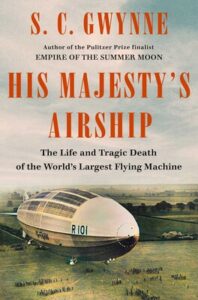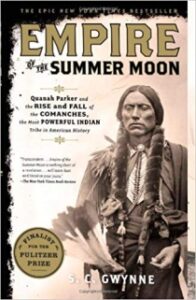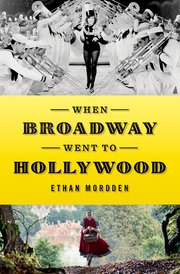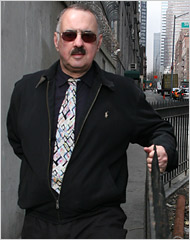S.C. Gwynne: His Majesty’s Airship interview by David Wilk
August 28, 2023 by David
Filed under Non-Fiction, WritersCast
 His Majesty’s Airship: The Life and Tragic Death of the World’s Largest Flying Machine — Sam Gwynne — Scribner — 9781982168278 — 320 pages — hardcover — $32.00 – May 2, 2023 — ebook versions available at lower cost
His Majesty’s Airship: The Life and Tragic Death of the World’s Largest Flying Machine — Sam Gwynne — Scribner — 9781982168278 — 320 pages — hardcover — $32.00 – May 2, 2023 — ebook versions available at lower cost
Sam Gwynne is the author of the outstanding Empire of the Summer Moon, a book I really loved. In this new work, he tells the story of a very different sort, documenting the British airship R101, but covering essentially the entire rise and fall of “lighter than air” powered flight. Like so many other airships, R101 crashed horribly in 1930 and killed almost its entire crew, including the leadership of the British airship industry, which at the time still hoped for an empire conquering means of travel. It was a massive case of a foolish, hubristic belief in something that could never succeed. It’s tempting to view this disaster as symptomatic of an empire in decline.
At least for a time, airships were a symbol of the future. R101 was, in fact, the largest aircraft ever to have flown and the product of what appeared to be advanced engineering. Somehow its supporters simply failed to recognize that these massive, hydrogen fueled, uncontrollable flying structures were bound to fail.
There is a captivating cast of characters at hand, including German inventors, well-to-do aristocrats to brilliantly flawed engineers, alcoholic flyers and even a Romanian princess and her doomed romance with the leader of the British airship program.
Gwynne is a masterful storyteller and is able to bring a previously obscure piece of twentieth century history to life for modern readers. It was a pleasure to speak with him about this book, his working methods as a writer of history, and a range of other topics as well. I’m looking forward to reading Sam’s next book, on any subject he cares to write about. He is that good a writer.
S.C. “Sam” Gwynne is the author of acclaimed books on American history: Empire of the Summer Moon and Rebel Yell: The Violence, Passion, and Redemption of Stonewall Jackson, Hymns of the Republic: The Story of the Final Year of the American Civil War, and The Perfect Pass: American Genius and the Reinvention of Football. He grew up in Connecticut, went to Princeton and Johns Hopkins, and now lives in Austin, Texas.
Sam has written for Texas Monthly and for Outside magazine. He was a Correspondent, Bureau Chief, National Correspondent and Senior Editor for Time Magazine and has also written for the New York Times, Harper’s, Los Angeles Times, San Francisco Chronicle, California Magazine, Boston Globe, Dallas Morning News, and other publications.
Buy the book from Bookshop.org
“Aviation history is nothing less than miraculous; it took a mere sixty-three years, after all, to get from the Wright brothers to Neil Armstrong. Barely a century ago, however, our skies were filled with a bounty of gliders, biplanes, and flying boats; balloons, blimps, and zeppelins. With His Majesty’s Airship, the inimitable Mr. Gwynne explores in vivid detail how this dream bloomed, and how it, in time, fell tragically to earth. He has written both a remarkable history and an eye-opening revelation of technology’s recurrent phantasms.” — Craig Nelson, award-winning author of Pearl Harbor and Rocket Men

Podcast: Play in new window | Download
Ethan Mordden: When Broadway Went to Hollywood
February 26, 2017 by David
Filed under Non-Fiction, WritersCast
 When Broadway Went to Hollywood – Ethan Mordden – Oxford University Press – Hardcover – 9780199395408 – 272 pages – $29.95 (ebook versions available at lower prices)
When Broadway Went to Hollywood – Ethan Mordden – Oxford University Press – Hardcover – 9780199395408 – 272 pages – $29.95 (ebook versions available at lower prices)
Ethan Mordden is probably our leading commentator and historian of Broadway musical theater, as well as their somewhat more fraught Hollywood musical cousins. This is a really fun and enlightening book for anyone who is interested in the history of this unique modern American art form. Even if you don’t love musicals, the history of musical theater and its relationship to the movie business is integral to an understanding of twentieth century mass entertainment and popular culture.
The success of the now iconic musical movie, The Jazz Singer, which was among the first films to integrate synchronized music into a storyline in the late 1920s, spurred many of the best songwriters of the “Great White Way” to go west in search of riches. The list included George and Ira Gershwin, Cole Porter, Richard Rodgers, and Lorenz Hart, among many others, who like many New York based playwrights, were enticed by the huge amounts of money paid by Hollywood producers for established east coast talent.
But when Broadway writers and songwriters ran into the very different business and production methods of the movie business, it did not always work out for the best. Movie producers did not want to follow the same structure and outlook of the theatrical forms, and had to aim their products to a very different kind of audience than attended musical theatre in New York City, which Mordden very brilliantly identifies as segmented by the geography and cultural divides of twentieth century America.
There are so many interesting themes to this book. Mordden discusses the various struggles that Broadway songsters had with the Hollywood system, traces the history of the musical in theater and film, and critiques the best and worst productions of both coasts. Reading this book, we get to think about some really interesting questions – did Hollywood create opportunities for storytelling with music, or is film simply antithetical to the musical form? Are movie musicals and theatrical productions really compatible at all?
Mordden has great stories to tell about so many of the people involved in both theater and film, has probably seen more movies than anyone you will ever meet, and knows enough about music to really talk about it technically in a way the average reader will understand. He makes sense of a lot of complicated history and along the way, we get to learn some behind the scenes stories about the great musicals most readers of this book love to watch, and some of the truly terrible musical films that Hollywood has managed to create over the years.
Ethan Mordden started out in theater, as both composer and lyricist; he wrote musicals, but he is best known as a prose writer. Mordden’s fiction output includes several gay themed novels in his “Buddies” cycle, as well as some excellent historical fiction, including The Jewcatcher, and most recently One Day in France. He is also a prolific writer of non-fiction, including six volumes detailing the history of the Broadway musical from the 1920s through the 1970s, guides to orchestral music and operatic recordings, and a cultural history of the American 1920s entitled That Jazz! He has also published Demented, an examination of the phenomenon of the operatic diva, and a coffee-table book on the works of Rodgers and Hammerstein. His Love Song: The Lives of Kurt Weill and Lotte Lenya is a dual biography chronicling the romance and professional collaboration of these two icons, and in 2013 he published Anything Goes: A History of American Musical Theatre. He has also written a number of books on film.
Having grown up in a family that lived some of the history in this book, talking to Ethan about the meeting of Broadway and Hollywood through musicals was tremendous fun for me. He is witty, charming and always entertaining. I think you will really enjoy listening to this conversation.
Podcast: Play in new window | Download
